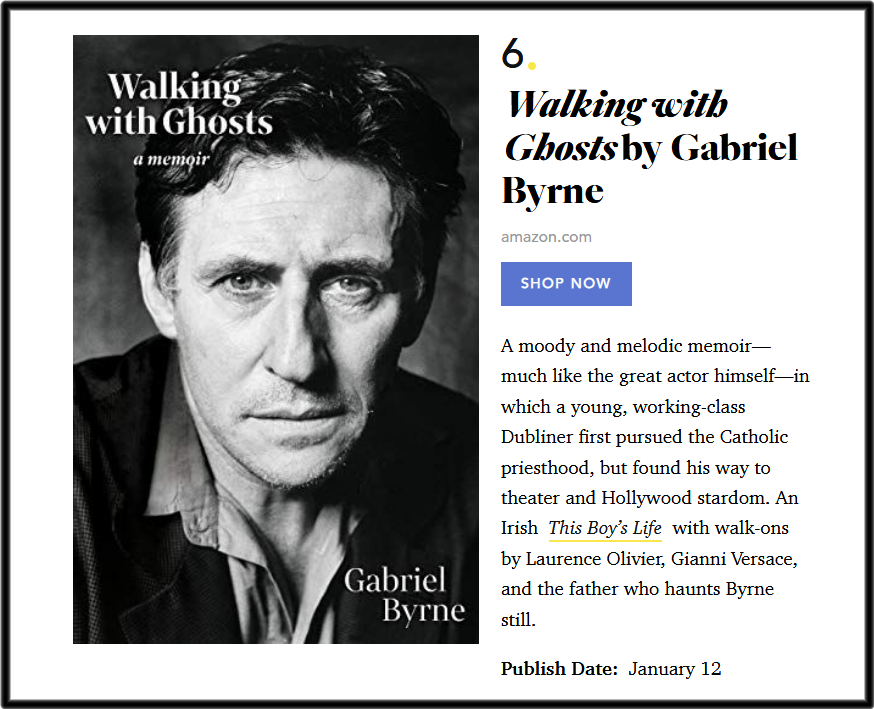Amazon Alerts are so much fun!
So, Byrneholics and others in the USA finally got their hands on Gabriel’s book. Here’s proof:





And the reviews are rolling in as well: All good, several raves, and a few almost incandescent in their response.
reviews
Air Mail
The Dubliner, by Dan Sheehan, January 9, 2021
[Note: You can read the entire review for free, but only on that first click. If you leave and then return, Air Mail wants you to sign up for a subscription, even though they call it a Free Trial. So beware and be fast! smile ]
Hollywood may have become the backdrop to his life, but Dublin, if only the Dublin of youthful memory, remains the setting, and it’s a world he conjures exquisitely. Byrne’s descriptions of his parents…and the city they inhabited are at the heart of this book, so tenderly and vividly wrought that reading them feels like stepping into someone else’s reverie: a melancholy swaddle of soothing voices and dissolving dreamscapes … The excavations of Byrne’s early traumas…are stark and heartbreaking … That he’s been able to alchemize these traumas into something so beautiful feels like deliverance, and reads like a gift.
A melancholy but gem-like memoir, elegantly written and rich in hard experience.
Kirkus Reviews
Toronto Star
Walking With Ghosts, by Gabriel Byrne (Grove Press)
This book is an unexpected pleasure. Take any idea of what you might have about a celebrity memoir and put it aside; it’s beautifully written, very literary and Byrne’s celebrity is almost incidental to his life. Rather than the usual celebrity fare (Byrne really hit stardom in 1995’s “The Usual Suspects” and has some 40 movies to his credit) this one speaks to the heart of the person. Byrne writes about growing up in working class Ireland the eldest of six children — his memoir filled with characters and stories: from his childhood just outside Dublin; his school days; when he was 11 years old and he left home to train as a priest. He weaves back and forth through time, the impact of a person or a thing only becoming clear, sometimes, years later. This is not a long memoir but his writing is so rich it conveys depths. He can give you a sense of lost love, for example, with a line or two: “We were given minted honey and yogurt and cool retsina by a young monk … And now there was only this photograph, the ghost of her smiling at me in the shade of cypress trees.”
Publisher’s Weekly, January 2021
Starred Review: Walking with Ghosts: A Memoir
In this intimate memoir, Irish actor Byrne charts his rocky rise to stardom and his battles with alcoholism. An introvert and the eldest of eight siblings growing up in 1950s and ’60s working-class Dublin, Byrne was an altar boy who enrolled in seminary school at 11. But he quickly distanced himself from religion after being molested by a priest: “I’ve been picking at it with a pin ever since… afraid to use a jackhammer.” After leaving seminary, he worked odd jobs, joined an amateur theater group, and landed a role on The Riordans, an Irish soap opera, in the late ’70s. Though he was considered a sex symbol, Byrne writes of feeling insecure and unattractive thanks to “my thrice-broken nose and beetroot-colored face.” When, in 1995, Byrne achieved international stardom with The Usual Suspects, he hit rock bottom: one morning he woke up wearing a bloody shirt and shaking violently from alcohol withdrawal, and was jolted in terror when a woman whom he could not name stirred in the bed beside him. This led to him reaching for help and getting into a recovery program. Byrne writes with candor and an exceptional humility, and has an easy hand with clever turns of phrase. Simultaneously frank and emotionally stirring, this memoir entrances. (Jan.)
Kirkus Reviews, January 2021
The acclaimed Irish actor recalls his path to success and the well-cloaked turmoil he faced along the way.
It’d go too far to say that Byrne (b. 1950), star of The Usual Suspects and In Treatment, is as fine a writer as his countrymen James Joyce and Seamus Heaney. However, he writes with much more depth than the typical celebrity memoirist, accessing some of Heaney’s earthiness and Joyce’s grasp of how Catholic guilt can shape an artist. Growing up in Dublin, he aspired at first to be a priest, seduced by images of “young lads with dodgy haircuts, beatific smiles gazing heavenward to answer the call to the priesthood.” But a priest’s sexual assault soured him on the church, and he stumbled through a variety of menial jobs, including a stint as “a toilet attendant at a major Dublin hotel.” There’s no cheerful tone of dues-paying here: Pride isn’t in Byrne’s nature (he saw it drown a childhood friend who died bragging he could hold his breath). The author grew up with a schizophrenic sister who died young, developed a slow-growing alcoholism, and feared abject failure. The sudden success of The Usual Suspects left him with “such tumult in my mind I was afraid I would fall down and be found weeping in the street.” Despite the darkness, Byrne also possesses a winning dry humor that reads as authentically humble: his mother finding ways to cut him down to size in public by sharing embarrassing childhood stories, the time he had to audition for Hamlet using a motorcycle helmet for Yorick’s skull. There’s little in the way of celebrity dishing, but the author shares a boozy conversation with Sir Richard Burton, who cautioned him that fame is “a sweet poison you drink of first in eager gulps. Then you come to loathe it.” Byrne is an impressive chronicler of both his eager gulping and his loathing. A melancholy but gem-like memoir, elegantly written and rich in hard experience.
BookMarks January 12, 2021
What the Reviewers Say: A compilation of book reviews from both sides of the pond.
interviews
Zibby Owens’ Moms Don’t Have Time to Read Books Podcast with a Complete Transcript, too!
Gabriel Byrne’s memoir is absolutely gorgeous, and he has so much wisdom to share. His interview with Zibby was briefly interrupted by a goat in the background, but they still got to chat about how his love of literature started with his mother reading classics at bedtime, finding his authentic voice, and the deep work it took to write about the most painful areas of his life.
LitHub, January 13, 2021
Gabriel Byrne Talks Memory, Loneliness and More With Karl Geary
In Conversation About Byrne’s Memoir Walking with Ghosts
KG: Something we’ve talked about before, is this notion of memory, it’s reliability. That as soon as we have the memory, we’ve rewritten it, it’s forever changed. And you had brought up William Maxwell. He says, “In talking about the past, we lie with every breath we draw.”
GB: In relation to Maxwell, I think what he was saying is that there’s a very thin line between memory and imagination and that a novelist, as you well know, imagines the world. And I think somebody who’s writing a memoir is involved in the excavation of fact, revealing some kind of truth. But how dependable is that fact? I think that in terms of memoir, the unadorned fact is just a newspaper column. What you have to do is to try to use the imagination in a way—not to be untruthfully in the moment—but to see how you can add to the truth of this by adding in details and call on that sensual world, not to be dishonest, but to say, “how can I actually convey this thing here that will make people understand that moment of unadorned fact?” Does that make sense?
KG: Yes, it does. It absolutely makes sense.
GB: And maybe you can answer this question? Fundamentally, if you’re writing a memoir as opposed to a novel, the memoir is bound in by the walls of what happened. But as a novelist, you’re not restricted by factual truth. You are restricted by a certain truth, of course, because you want to make the novel as truthful as possible. How free do you feel starting a novel knowing that your canvas is totally blank and free? Is that frightening or is that liberating?
KG: I think for any writer, the blank page is terrifying. It’s an interesting journey, because like writing a memoir, as soon as you take a step in any direction, you’ve locked into something. And I think that’s worth trying to resist, particularly early on, locking in too strictly. If you’re writing from a character base, you have to allow enough room to listen to that character and allow them to navigate. So, you’re always listening to someone’s voice, be your own, or fictional.
The tantalizing thing about the quote above is that we think Gabriel Byrne is now working on his first novel . . .
You can read more at The New Yorker on William Maxwell: novelist, editor and contributor, memoirist, and essayist.
Finally, let’s not forget People Magazine!

So, if you have not already, head out, virtually or in the real world if you can, grab Gabriel’s book, and commence reading! I cannot think of a better way to get through the winter months than this book, something hot to drink, and a cozy fireplace. Enjoy it. Savor it. heart


















Well said. This book is indeed a gift.
Hi fellow fans!
I just ordered Gabriel’s book on Audible!
Enjoy!
Wonderful. Didn’t he say in his video message he hopes people like the book? Well, seems like people do…if you’re reading it/have read it, got the audiobook…let me know your thought on this: Would you really like to see a movie of this memoir? (Or even as a play??)
Me-I would. How do you feel?
Love the info and his words. Just to add my thoughts and prayers for the people of Ireland right now with covid.
I love his book.
I am reading it for the second time now. It is so full of real life and great descriptions.
The interview with Zibby is so great.
It reminds me again why I like Gabriel Byrne so extremely very much.
He has thought about most things in life, and he shares it with us.
He always see things in a new and important light, and I am nodding to myself, when
he speaks, and I think, yes, that is SO right, Thank you to him for expressing important thoughts in words and make me understand a little more of life.